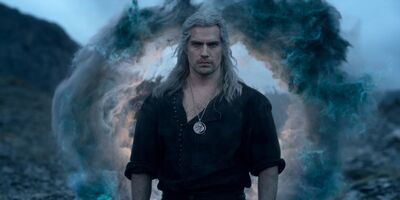
When Max (Brian Cox) is released from prison early due to good behavior (and pancreatic cancer), he has nowhere to go. He still has contacts from his former life as a "heavy" in the Las Vegas underworld, but he has no desire to get back into all that. What he wants to do with the months he has left is reconnect with his daughter Maxine (Kate Beckinsale). Unfortunately, she wants nothing to do with him. She is the struggling single mom of son Ezra (Christopher Convery), piecing together random jobs so she can pay for Ezra's epilepsy medication. Maxine doesn't have the bandwidth for some delayed affectionate reunion with her father, who let her down in many ways. But she caves. Max moves in with Maxine and Ezra. "Prisoner's Daughter," directed by the talented Catherine Hardwicke, details the chaos and catharsis of what comes next.
With a script by Mark Bacci, "Prisoner's Daughter" unfolds on fairly predictable lines: the slow melting of Maxine towards her father, the bond formed between grandfather and grandson, etc., and Brian Cox and Kate Beckinsale fill their thinly-drawn characters with backstory and fleshed-out complicated emotions. Every scene is loaded with baggage from the past. Ezra, bullied at school for his seizures, needs a father figure since his own dad is a drug-addicted loser named Tyler (Tyson Ritter), who plays in a "band" and lives in what he calls "an artists' co-op" (really just a drug lair). Ezra wants to see his dad more. Tyler demands to be a part of his son's life. Maxine knows the dangers and is willing to be the "bad guy," refusing Tyler access. Max, ensconced in the small house, tries to intervene. Sometimes this goes well, other times, not so well.
Good scripts make you forget they are scripts. The script for "Prisoner's Daughter" is quite talky and never takes wing. You can almost see the words on the page, despite the strong efforts of Beckinsale and Cox. Young Convery (very good in a similar role in "Pinball: The Man Who Saved the Game") doesn't fare as well. While Ezra is what you'd call "precocious," his dialogue tilts into cutesy and sounds like it was written by someone who doesn't know kids. The self-aware wisecracks grate, as does the calm ability to initiate difficult emotional conversations with adults, using therapeutic-speak, like a sit-com kid, circa 1987. It's hard to get past this problem. If dialogue doesn't sound real, nothing else has a chance to lift off. The film is betrayed by its final sequence, where Max takes matters into his own hands, a plot development from a different type of movie altogether. And so what could have been character-driven is plot-driven after all. "Prisoner's Daughter" deflates.
If you only saw Las Vegas in film, you'd think it was solely made up of the neon strip and populated by gangsters, high-rollers, and showgirls. But Las Vegas is, of course, a place where normal people live. Similar to Alexander Payne's "The Descendants," taking place in a Hawaii rarely shown in film, "Prisoner's Daughter" evokes Las Vegas in all its desert beauty and squalor (the "artists' co-op" is the grungy stuff of nightmares). Maxine refers to her little house as a "dump," but it has a backyard, and an unfinished garage, and she's done her best to make it homey despite her limited means.
The film's best moment is a small one where Maxine is offered a job in a corporate laundromat. The awestruck look on Beckinsale's face when "health insurance" is mentioned during the job interview is piercing and eloquent. Emotion doesn't have to be conveyed with words. The moment is an indictment of the entire stinking system, where the ability to pay for your son's crucial medication is tied to employment. It's inhumane.
In "Lords of Dogtown," Catherine Hardwicke did a very difficult thing: she captured the vibe of a specific scene. Subcultures are sometimes impenetrable to outsiders, and skateboarding/surfing in '70s California was a real vibe, and Hardwicke nailed it. Hardwicke's first film was "Thirteen," a frightening look at two newly-teenage girls, hungry for experiences far beyond their years. Hardwicke approached the material with fearless intimacy. She also helmed the vibe-iest film of the 2000s, "Twilight," with moody teenage love unfolding in the chilly light of the Pacific Northwest. "Twilight" is the best of the franchise, made fun of by those who pooh-pooh films championed by teenage girls. Meanwhile, teenage girls are cultural weathervanes, and Hardwicke caught that spirit. Teenage girls often spot things first and point the way. Hardwicke reveled in the spectacle of gloomy Kristen Stewart and glittery Robert Pattinson. She understood the subtext. These three films make up an extremely strong start.
"Prisoner's Daughter" is tepid by comparison, but Hardwicke does her best to embed herself in the story, trying to catch the vibe. However, there is no vibe. She tries to create something that isn't there to begin with. This is the job of any talented director, particularly with a script as clunky as this one. Hardwicke has a good eye, a good ear, and a sensitive feel for atmosphere. Hopefully her next project will give her the space to show what she can actually do.
Now playing in theaters.
Sheila O'Malley
Sheila O'Malley received a BFA in Theatre from the University of Rhode Island and a Master's in Acting from the Actors Studio MFA Program. Read her answers to our Movie Love Questionnaire here.

Prisoner's Daughter (2023)
Rated R for language and some violence.
98 minutes
.png)














 English (US) ·
English (US) ·